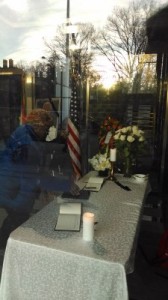It’s no secret that I’m politically liberal and like many of you have been stunned and disheartened by the first month of the current administration in the United States. But my role on this site is more pastoral than political, and besides there are others who can speak more eloquently and with greater detail than I can about what might come and how it may be responded to. What then is a faithful Christian response to the current situation?
First, I’ve made peace knowing that I cannot come up with a comprehensive solution and don’t expect you to have one either. Good ideas can quickly become fossils, and the moment requires nimbleness and discernment or else each of us will come overwhelmed, and then defeated. (We also have to be comfortable with language of conflict, or else we will delude ourselves about what is happening.)
That’s why — above all else — I remind myself of my core convictions. I need to know what I’m defending: not only the standards of American democracy, but social compact based on decency and mutual respect, characteristics the incumbent president sorely lacks. This is congruent with my faith, and beneficial to decent people of any faith or none. So I don’t have to hold myself to some pious and self-defeating false standard about what Christians should or should not do; I just need to know what I want at the end of this process. The common good, I suppose, above all else. That’s a work in progress, but it will be neither what we have now or what we have had recently.
Discernment like this is one tool on the path towards wisdom, and I’ve been thinking a lot about Jesus is saying in Matthew: “Be ye therefore wise as serpents and harmless as doves.” (10:16) I’ve seen enough debilitating and catastrophizing rhetoric on the Left — sometimes with unproductive rage towards political opponents — to know that harmlessness or gentleness is necessary for an eventual solution to this crisis. Why? Because there are a lot of people with whom I might agree politically who have a spiritual knife in the hand, pointed towards their own hearts. This is misplaced energy: fear or rage taking the place of constructive action, even so simple as listening to those in Federal service or dependent upon Federal funding for their livelihoods, or preparing for the destruction of programs which may or may not be legitimately in the president’s purview. The performance of outrage benefits no one, including the performer.
The tone is this post is not accidental. If the president wishes his enemies destroyed, there is no easier path for him than they destroy themselves: emotionally, morally or spiritually. With Christians in all times, we bear the strain with humility and grace, relying on the prayers and example of those whose suffering is and was immeasurably greater. We will not increase our suffering by debasing ourselves, but rather uplifting one another. Christian vocation prepares us for stressful and painful moments, and it is a blessing and opportunity we might share with others who struggle deeply and without relief. If we should find ourselves better persons at the end of the current crisis, let us count it as specks of gold mixed with the ashes.






